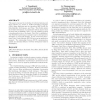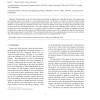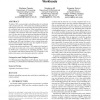970 search results - page 110 / 194 » Symbolic timing simulation using cluster scheduling |
VALUETOOLS
2006
ACM
14 years 4 months ago
2006
ACM
This paper proposes the modeling of technical systems and their behavior by means of Unified Modeling Language (UML) State Machines and the extending UML Profile for Schedulabil...
HPDC
2009
IEEE
14 years 4 months ago
2009
IEEE
Large-scale distributed computing systems such as grids are serving a growing number of scientists. These environments bring about not only the advantages of an economy of scale, ...
FGCS
2007
13 years 10 months ago
2007
: Metaschedulers in the Grid needs dynamic information to support their scheduling decisions. Job response time on computing resources, for instance, is such a performance metric. ...
SEUS
2010
IEEE
13 years 8 months ago
2010
IEEE
Most of the existing clock synchronization algorithms for wireless sensor networks can be viewed as proactive clock synchronization since they require nodes to periodically synchro...
SIGMETRICS
2010
ACM
14 years 2 months ago
2010
ACM
We define CWS, a non-preemptive scheduling policy for workloads with correlated job sizes. CWS tackles the scheduling problem by inferring the expected sizes of upcoming jobs bas...



